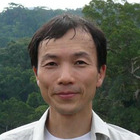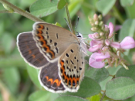Researches in my lab focus on ecology and evolution of species interactions. As a model coevolutionary system, my students and I studied the three-way interaction among ant plants (Macaranga spp.), their inhabitant ants (Crematogaster spp.) and trophobiont scale insects (Coccus spp.) in collaboration with researchers at Harvard and Kyoto. This tripartite association is highly species-specific, and the molecular phylogenies of the three partners radiate contemporaneously, suggesting their associated diversification since the mid-Miocene (~12 My) in Asian wet tropics. In Shinshu, where we have the most diverse fauna and flora in Japan, we are analyzing associated ecological and genetic differentiation of ants and their associated insects by sequencing genes of the insects and by swapping the species specific partners. In the field, we are also investigating processes and mechanisms of the mutual counter adaptation between soldier aphids and their specialist predators, competition and coexistence of aphid-tending ants, and ecological mechanisms maintaining ant-aphid species specific interactions.
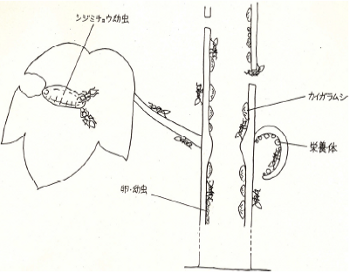
Symbiotic interaction among ant plants (Macaranga spp.), their inhabitant ants (Crematogaster spp.), trophobiont scale insects (Coccus spp.), and herbivorous butterflies (Arhopala spp.)
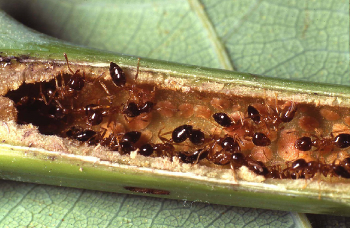
Specialized ants (Crematogaster spp.) living in ant plants (Macaranga spp.) as "body guards"
Stick with whatever you like!
My message to all of you, candidates for admission, is "Stick to whatever you like! ". Do you have what you are good at, what you like, or what you want to do? If you do not have any, don't worry. You can find it after you are enrolled. But if you like something, please do stick with it.
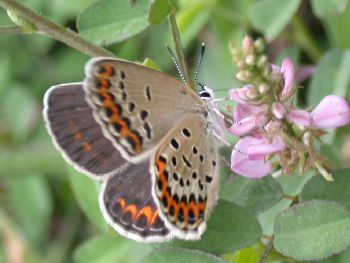
The Reverdin's Blue visiting flowers of false Indigo. The larvae of this butterfly eat leaves of false Indigo, and are attended by bodyguard ants.
1. What kind of people are there in Faculty of Science, Shinshu University?
You start to read textbooks of world history and you will be sleeping after 10 minutes, but you are eager to read insect illustrated encyclopedia for hours. You are not good at studying ancient writings, but if you are at a zoo, you will not get tired of watching animals all day long. We are waiting for you! There are plenty of biology-related departments, such as Faculty of Science, Department of Agriculture, Faculty of Veterinary Medicine, Medical School, Department of Pharmacology and so on. Among them, Faculty of Science may not be splendid in terms of acquiring knowledge and skills directly linked to employment. But for those really like creatures, or like to find out new things, the four years in Department of Biology, Faculty of Science, Shinshu University must be exciting and give you unparalleled experience!
2. My days at high school and transformation at university
My high school days were rather gray. Actually, when I was younger, I loved to breed insects and collect insects very much. But after enrolled at high school, I devoted myself to "studying for entrance exams". However, it was difficult to hold down my love to insects, and I found time and went trips for insect collection. Today, I realize it was the time of "pupa" before I "emerge". After I was enrolled at university, I could do whatever I wanted: I climbed mountains in Japan, observed bees and wasps, joined vegetation survey, and at the end of the third grade I went to Borneo to study wasp behavior.
3. Why should you choose Shinshu?
A reason to recommend Shinshu University to those who love living organisms is because you can meet with various interesting animals and plants in the neighborhood of the university campus. The fact that living creatures with interesting behavior and/or ecology live close to you, is a great merit for you to advance outdoor research.
Another reason to recommend Shinshu University is that you will be surrounded by many friends who gathered at Shinshu because of its diverse fauna and flora. Although I wanted to "gather" at Shinshu when I was enrolled at university, I happened to pass another university so that I was a little late coming here. Either way, I realize that in Shinshu, "naturalists" and "biology people" are gathering together not only in the university but also out of the university.
4. What will you gain at Shinshu University?
If you are enrolled as "naturalist" and graduate as the same "naturalist", there is no merit to you. Then, what do you acquire at Faculty of Science, Shinshu University?
I think that is "logical thinking" and "critical thinking". The former is the power of logic to convince people by building up hypotheses, arranging things that were frustrating, conducting research, and demonstrating evidence for/against the hypotheses. The latter is the power of criticism: verifies the logic of others, and discusses. I believe these two powers will transform you from "naturalist" to "scientific intellectuals"!
